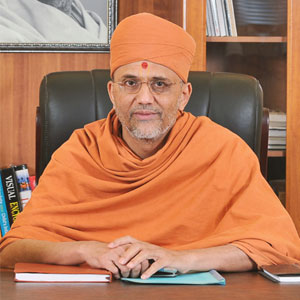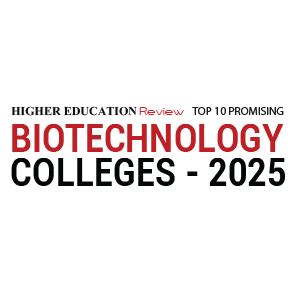
Atmiya University: Nurturing Youth Through Value-Rich & Skill-Driven Education
By P P Tyagvallabh Swamiji, President
Biotechnology institutions in India must embrace an industry-integrated model with value-driven education and cutting-edge laboratory infrastructure to remain relevant in today’s rapidly evolving landscape. This comprehensive approach fosters practical skills, a research-oriented mindset, and ethical grounding, critical for innovation, global competitiveness, and meaningful societal contribution.
Hands-on experience with advanced instrumentation, backed by strong industry collaboration, ensures students effectively bridge theoretical knowledge with real-world applications. Atmiya University exemplifies this model, producing well-rounded biotechnology professionals rooted in knowledge, skills, and human values. Its recent Grade “A” accreditation from NAAC in Cycle-I further reaffirms its position as a center of academic excellence and value-based higher education.
Located in Rajkot, Gujarat, Atmiya University was founded on April 13, 2018, under the Gujarat Private University Act 11, 2018. It is inspired by H.D.H. Brahmaswaroop Hariprasad Swamiji Maharaj Presently P.P. Premswaroop Swamiji Maharaj and sponsored by Sarvoday Kelavani Samaj, affiliated with Yogi Divine Society-Baroda. Guided by the motto Suhradam Sarva-Bhutanam, “well-wisher of all living beings”, the university proudly embraces its Sanskrit origin "?? ?? ????? ??? ?????? ", signifying universal goodwill and compassion.
Its vision and mission are shaped by a dynamic leadership team comprising Dr Sheela Ramachandran (Pro- Chancellor), Dr Ajay Jain (Pro-Chancellor – CVMS), and Dr Rakesh Mudgal (Vice-Chancellor).
Spanning 23.25 acres of lush greenery, Atmiya University offers a well-designed campus with state-of-the-art infrastructure and holistic support facilities that encourage both academic and personal development. Recognized under Section 2(f) of the UGC Act, 1956, and approved by AICTE and PCI, its curriculum aligns with SDGs and Universal Human Values through CBCS, OBE, and a semester pattern. Programs incorporate ethics, gender equality, sustainability, and skills.
The seven faculties include Engineering & Technology, Science, Business & Commerce, Health Sciences, Humanities, Social Sciences, Liberal Studies, and Transformative Education. It offers 17 Ph.D., 13 PG, 1 PG Diploma, 1 Integrated PG, and 20 UG programs. Introduced in 2022, the Faculty of Transformative Education focuses on Consciousness Development, Value Education, Bharatiya Gyan Parampara (IKS), and Sustainable Development, fostering purpose-driven learning.
Atmiya University’s campus is equipped with modern amenities including an EVAC charging station, doctor on call, 499.5 KW PV solar rooftop, backup generator-RO plants, paper and plastic recycling units, a 17-lakh litre rainwater harvesting facility, and a 110KL Sewage Treatment Plant (STP). Academic facilities feature digital classrooms, specialized labs and a Controller of Examination office.
Student amenities include language labs, placement cell, hostels, canteen, sports, NCC-NSS, daycare, gym, yoga and wellness center, ATM, PMJAK, botanical garden, Nakshatra Vanam, and accessibility features like ramps and elevators. The centrally air-conditioned, four-storeyed automated library employs Java Web Start™ Technology, adheres to global standards, and houses 45,802 print titles, 119,334 volumes, and 300,000+ e-books.
Atmiya has held this GPCB recognition as a Schedule-1 Environmental Auditor since 2010, underscoring its long-standing commitment to environmental stewardship. With numerous MoUs, awards, and an alumni network of over 1 lakh making societal contributions worldwide, the university continues to drive forward its mission of holistic, value-based education.
Atmiya University nurtures minds with knowledge, values, and purpose by empowering students to innovate, lead ethically, and transform society
A Distinctive Approach to Holistic Education
What sets Atmiya University apart from many contemporary institutions is its unique integration of academic excellence with universal human values (Jeevan Vidya). Education here transcends the mere transmission of knowledge, it becomes a transformative experience that builds character, emotional intelligence, and a sense of purpose. Ravi Tank, Director of the Centre for Total Quality Management, shares, “At the core of our university’s pedagogy is the Chetna Vikas Mulya Shiksha Cell (CVMS), which conducts structured programs based on universal human values (Jeevan Vidya).
These initiatives go beyond the curriculum to engage students in understanding life, relationships, and inner well-being. This value-centric education fosters leaders who innovate with integrity and lead with compassion, which are traits essential in today’s complex world”.
In a region where many students come from rural and economically disadvantaged backgrounds, Atmiya University places a strong emphasis on access and affordability. Over 70 percent of students receive financial aid through government schemes, institutional funds, NGOs, industry collaborations, philanthropists, and alumni. Earn-while-you-learn opportunities through centers like Sarjan, Samarth, Parivartan, Niramay, and the library provide practical work experience and financial relief, ensuring that no deserving student is left behind.
Academic Excellence Meets Industry Relevance
Atmiya University’s academic approach is built around Outcome- Based Education (OBE) and industry-oriented curricula. Academic boards work in close collaboration with industry leaders to ensure that programs are updated with current trends and expectations. 100 percent placement-tailored programs like BCA with Rajkot IT Association, BCom with Logistics Sector Skill Councils, and B.Com. Professional Accounting, aligned with ICAI/ICSI/ACCA, is just a few examples of how this university seamlessly bridges the gap between theory and practice.
In addition, every student undertakes two internships, one in their academic domain and another in a social immersion setting, grounding them in both professional skills and social awareness. CoE for Metamorphosis is committed to providing Infrastructure like the Tinkering Lab, Fab Lab, Robotics & Embedded Systems Lab, and Knowledge Resource Centre, further equipping students with hands-on learning experiences along with IPR support.
Workshops, Seminars & Experiential Learning
Atmiya University strongly advocates learning by doing, cultivating an academic environment enriched through workshops, training programs, and interdisciplinary events. The university has established state-of-the-art academic and research infrastructure, including specialized laboratories such as Animal Tissue Culture, Plant Tissue Culture, Bioinformatics, Genetic Engineering, Research Laboratories, and Central Instrumentation Facilities with advanced equipment.
Life science students gain hands-on experience using sophisticated instruments like HPLC, PCR, and UV-Vis Spectrometry, while others participate in entrepreneurship boot camps, design thinking sessions, and career acceleration programs focused on 21st-century skills, including communication, leadership, and personal branding. Innovation and entrepreneurship are further supported through SSIP, the Ministry of Education's IIC rankings, and e-Yantra initiatives with IIT-Bombay, e-YUVA program with BIRAC.
Peer-learning platforms like Ignite, Abhyutthan, Abhyudaya strengthen the learning ecosystem. Students also engage in national and international conferences, seminars, industry visits, and community projects to build global perspectives and social awareness. With a strong footing in NEP 2020, the university is advancing MEME, ABC, and AI-enabled digital tools while deepening its faculty-student exchange programs and global collaborations, paving the way for academic excellence and international exposure.
In conclusion, Atmiya University stands as a testament to what holistic learning, deeply rooted in the Universal Human Values (Jeevan Vidya) can achieve. By seamlessly blending knowledge, skill, character, and compassion with an understanding of human-human relationships, human-nature harmony, and meaningful co-existence, it is shaping a new generation of leaders committed to creating a better world through innovation, ethics, and purposeful education.


